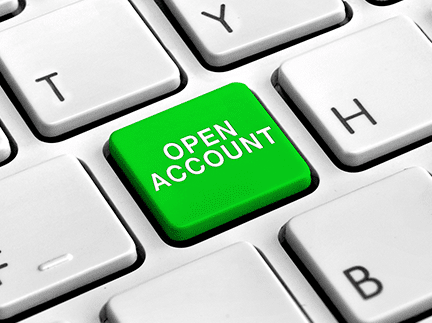Top Tips for Opening a Savings Account: Guarantee Reliable and smooth Setup
Opening a bank account might appear uncomplicated, yet a systematic approach can considerably enhance the experience and established the phase for a successful banking connection. By understanding the variety of account kinds offered, collecting vital documents, and comparing financial establishments, one can avoid common challenges. Furthermore, taking into consideration the subtleties between online and standard financial choices is essential. Nonetheless, one of the most vital action often exists in thoroughly evaluating the conditions-- an element many neglect. What complies with might make all the distinction in your financial experience and economic health.
Understand Different Account Types
When opening up a bank account, it is vital to familiarize on your own with the numerous account types available. Recognizing these choices will certainly enable you to choose an account that finest fits your financial demands and objectives.

Savings accounts, on the other hand, are created for conserving cash and normally offer higher rates of interest than checking accounts. They might have withdrawal constraints, encouraging you to save with time. For people looking for a greater return on their cost savings, CDs supply set rates of interest for a defined term, however they need you to secure in your funds until maturity.
Additionally, there are specialized accounts like cash market accounts and retired life accounts, each with unique functions and benefits. By thoroughly comprehending these account types, you can make educated decisions that straighten with your financial method and way of life.
Gather Required Documents
Collecting the required documentation is a critical action in the procedure of opening a checking account. Appropriate documents not only assists in a smooth application process but likewise aids in validating your identification, ensuring compliance with governing needs.
Typically, you will require to give a government-issued image identification, such as a ticket or chauffeur's permit. This acts as evidence of identity and residency. In addition, a Social Security Number (SSN) or Private Taxpayer Identification Number (ITIN) is usually needed for tax reporting objectives. Some bankss might also request proof of address, which can be shown through energy expenses, lease arrangements, or bank statements.

In addition, if you are a small, adult permission and identification might be needed. It's advisable to consult the details bank concerning their paperwork needs beforehand, as these can vary. By guaranteeing all necessary records are all set, you can accelerate the account opening process and prevent prospective hold-ups.
Study Banks and Costs
A complete comparison of numerous bankss and their fee frameworks is essential for choosing the appropriate banks for your needs. Different bankss offer a variety of services, and recognizing their costs can substantially affect your general banking experience. Begin by identifying your banking demands, such as whether you need an examining account, savings account, or both.
Following, take a look at the charge frameworks check this site out linked with each account kind. Usual charges consist of regular monthly maintenance fees, overdraft charges, ATM usage charges, and foreign deal costs. Some bankss might forgo these charges if you preserve a minimum balance or set up straight deposits.
Additionally, check out any costs associated with account solutions, such as wire transfers, printed statements, or check orders. It is additionally smart to assess the rates of interest offered on financial savings accounts, as these can differ dramatically amongst institutions.
Take into consideration Online vs. In-Person
Picking in between online and in-person banking can significantly influence your general banking experience and ease (bank account opening). Each choice offers special advantages that accommodate various preferences and lifestyles
On-line banking uses a high degree of adaptability and availability. With the ability to manage your account from anywhere making use of a smart device or computer, electronic banking permits quick deals, balance checks, and bill repayments at any time. Additionally, several online bankss provide competitive passion rates and lower charges because of lowered overhead costs.
On the other hand, in-person financial supplies an individual touch that some consumers might discover encouraging. Visiting a physical branch enables direct interaction with bank agents, which can be specifically beneficial for complex inquiries or monetary suggestions. In-person financial also enables customers to transfer cash, obtain instantaneous support, and construct partnerships with team, fostering a feeling of count on.
Eventually, the decision in between online and in-person banking must be based upon your specific needs, comfort degree with innovation, and the certain services you call for. Consider your financial practices and choices very my explanation carefully to identify which alternative lines up ideal with your monetary objectives.
Review Terms and Conditions

When assessing the conditions, pay very close attention to crucial elements such as charges, rate of interest, and account attributes. Look for monthly maintenance fees, deal restrictions, and penalties for overdrafts or early withdrawals (bank account opening). Comprehending these charges can aid you prevent unanticipated fees and manage your funds better
Furthermore, consider the rate of interest supplied on financial savings or examining accounts. Higher interest prices can substantially influence your cost savings over time. It's additionally essential to understand the terms associated with benefits, benefits programs, and advertising deals, as these can improve your financial experience.
Finally, ensure you know the bank's plans on customer support, disagreement resolution, and privacy. Acquainting yourself with these problems will equip you to make enlightened decisions and establish an effective connection with your bank. Making the effort to thoroughly examine the terms and problems can stop future misunderstandings and foster long-term contentment with your banking experience.
Conclusion
To conclude, an educated strategy to opening up a bank account assists in a effective and smooth configuration procedure. read this Comprehending the different account kinds, collecting essential paperwork, and investigating bankss and linked costs are essential steps. In addition, weighing the benefits of on-line versus in-person financial choices can improve comfort. Lastly, careful evaluation of problems and terms guarantees clarity relating to charges, features, and account owner obligations, eventually leading to a more satisfying financial experience.
Opening a bank account might seem straightforward, yet a methodical technique can dramatically improve the experience and established the stage for an effective banking connection.The most usual types of accounts include examining accounts, savings accounts, and certificates of down payment (CDs)Cost savings accounts, on the other hand, are designed for saving money and usually use higher rate of interest rates than checking accounts. Begin by identifying your financial needs, such as whether you need an inspecting account, savings account, or both.
Understanding the various account types, gathering required documentation, and researching bankss and associated charges are critical steps.